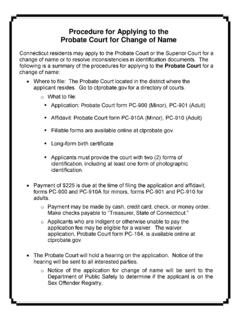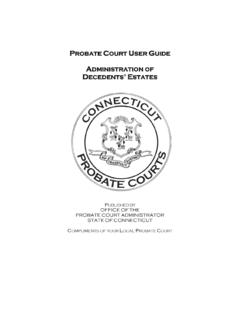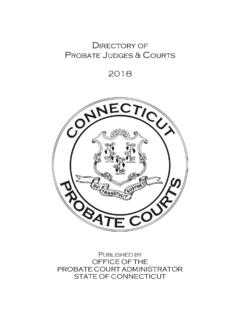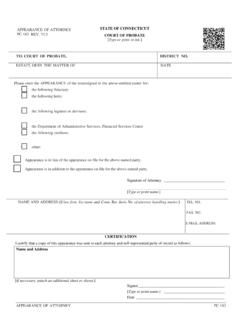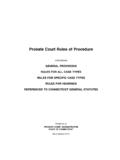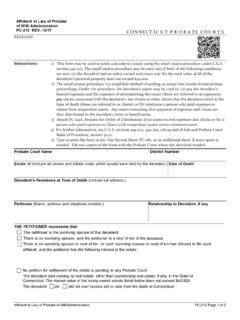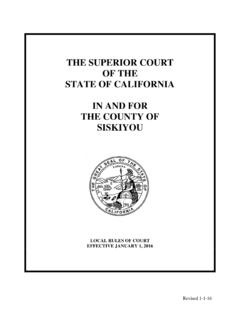Transcription of PROBATE COURT USER GUIDE
1 PROBATE COURT USER GUIDE FOR CONSERVATORS PUBLISHED BY OFFICE OF THE PROBATE COURT ADMINISTRATOR STATE OF CONNECTICUT COMPLIMENTS OF YOUR LOCAL PROBATE COURT Forms for conservatorships are available online at Click on Forms. Forms are also available at the PROBATE Courts. 2018 PROBATE COURT Administrator, State of Connecticut INTRODUCTION A family member or other concerned person who believes that a loved one is unable to care for himself or herself may petition the PROBATE COURT to establish a conservatorship for the individual.
2 The COURT will follow careful procedures to protect the rights of the individual while determining whether the individual is capable of making decisions about personal and medical care and managing his or her finances. If the COURT concludes that the individual is not capable, it will appoint an appropriate person to serve as conservator and will oversee the conservator s activities on an ongoing basis. This user GUIDE is intended to answer some of the questions you may have regarding the procedures, roles and responsibili-ties of the PROBATE COURT and the conservator whom the COURT appoints.
3 It should be considered only as a GUIDE on the conservatorship process and not as a substitute for competent professional advice. In addition to this user GUIDE , self-study training programs for conservators are available at The training programs provide a comprehensive overview of the responsibilities of a conservator. The self-study format enables a conservator to view the program when convenient and in installments that are suitable for the conservator s schedule. All new conservators should complete the training program within 30 days of appointment.
4 2 What is a conservator? A conservator is a person appointed by the PROBATE COURT to oversee the financial and/or personal affairs of an adult who is determined by the PROBATE COURT to be incapa-ble of managing his or her finances or unable to care for himself or herself. A conservator may also be appointed for a person who voluntarily requests such assistance. The term respondent refers to a person for whom a conservatorship petition has been filed. If the PROBATE COURT determines that the respondent is incapable and appoints a conservator, he or she is then referred to as a conserved person.
5 There are two basic types of conservatorships to accommodate the different needs of individuals. A conservator of the person is appointed to supervise the personal affairs of an individual who is found by the COURT to be unable to meet essential requirements for personal needs. These needs may include, but are not limited to, food, clothing, shelter, health care and safety. A conservator of the estate is appointed to supervise the finances of an individual who is found by the COURT to be incapable of doing so himself or herself to the extent that property will be wasted unless adequate property management is provided.
6 This may include, but is not limited to, actions to manage assets, income and public assistance benefits. A person may be in need of one or both types of conservators. Two separate individuals may perform these two roles, or one person may serve in both capacities. A conservator of the estate or person may be an individual, a legally authorized municipal or state official, a nonprofit organization or a business. However, a hospital or nursing home cannot be appointed as conservator. When a conservator is appointed, a successor conservator can be named as well.
7 The successor conservator replaces the appointed conservator if the appointed conservator resigns, is removed, is deemed incapable or dies. If such an event occurs, the PROBATE COURT will issue a decree confirming the authority of the successor conservator. An adult with intellectual disability may be in need of a conservator of the estate to manage his or her financial affairs, while a guardian of the person with intellectual disability is appropriate to oversee his or her personal affairs. For more information, please see the PROBATE COURT User GUIDE : Persons with Intellectual Disability.
8 Where does a person petition for the appointment of a conservator? In Connecticut, the PROBATE Courts have sole jurisdiction over the appointment of conservators. A person filing a petition for a conservatorship must apply to the PROBATE COURT for the PROBATE district where the respondent s permanent home is located or where the respondent currently resides or is currently located. If the conserved person moved to Connecticut within the past six months, it may be necessary to file for conservatorship in the state where the respondent previously resided. 3 Does the COURT have the authority to grant a conservatorship if Connecticut is not the respondent s home state?
9 There may be circumstances under which the COURT is able to appoint a conservator even if the respondent has not lived in Connecticut for six months. For example, the COURT could appoint a conservator if the respondent has significant connections with Connecticut or if the home state has declined to act because it has found that the Connecticut COURT is the more appropriate location to hear the matter. Even if the COURT would not otherwise have jurisdiction, a Connecticut PROBATE COURT could, in an emergency, appoint a temporary conservator for a respondent who is physically present in this state.
10 A temporary conservatorship lasts no longer than 60 days. Can a conservator be appointed for a minor? A conservator may be appointed only for a person who is legally an adult. That means that the person must have reached the age of 18. Prior to that time, the minor s parents or other guardian have the legal authority to make decisions for the minor. A parent or guardian who anticipates that the child will require a conservator upon attaining the age of majority may file an petition for appointment of an involuntary conservator up to 180 days prior to the date the minor will turn 18.
